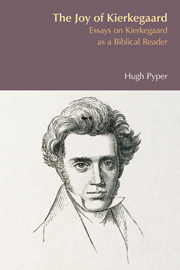Book contents
- Frontmatter
- Contents
- Preface
- Acknowledgments
- Abbreviations
- 1 The Joy of Kierkegaard
- 2 Kierkegaard's Canon: The Constitution of the Bible and of the Authorship in Concluding Unscientific Postscript
- 3 The Apostle, the Genius and the Monkey: Reflections on Kierkegaard's ‘The Mirror of the Word’
- 4 Your Wish Is My Command: The Peril and Promise of the Bible as ‘Letter from the Beloved’
- 5 The Lesson of Eternity: The Figure of the Teacher in Kierkegaard's Philosophical Fragments
- 6 Cities of the Dead: The Relation of Person and Polis in Kierkegaard's Works of Love
- 7 Adam's Angest: The Language of Myth and the Myth of Language
- 8 Beyond a Joke: Kierkegaard's Concluding Unscientific Postscript as a Comic Book
- 9 ‘Sarah Is the Hero’: Kierkegaard's Reading of Tobit in Fear and Trembling
- 10 How Edifying Is Upbuilding? Paul and Kierkegaard in Dialogue
- 11 Forgiving the Unforgivable: Kierkegaard, Derrida and the Scandal of Forgiveness
- Bibliography
- Index of Biblical References
- Index of Authors
6 - Cities of the Dead: The Relation of Person and Polis in Kierkegaard's Works of Love
- Frontmatter
- Contents
- Preface
- Acknowledgments
- Abbreviations
- 1 The Joy of Kierkegaard
- 2 Kierkegaard's Canon: The Constitution of the Bible and of the Authorship in Concluding Unscientific Postscript
- 3 The Apostle, the Genius and the Monkey: Reflections on Kierkegaard's ‘The Mirror of the Word’
- 4 Your Wish Is My Command: The Peril and Promise of the Bible as ‘Letter from the Beloved’
- 5 The Lesson of Eternity: The Figure of the Teacher in Kierkegaard's Philosophical Fragments
- 6 Cities of the Dead: The Relation of Person and Polis in Kierkegaard's Works of Love
- 7 Adam's Angest: The Language of Myth and the Myth of Language
- 8 Beyond a Joke: Kierkegaard's Concluding Unscientific Postscript as a Comic Book
- 9 ‘Sarah Is the Hero’: Kierkegaard's Reading of Tobit in Fear and Trembling
- 10 How Edifying Is Upbuilding? Paul and Kierkegaard in Dialogue
- 11 Forgiving the Unforgivable: Kierkegaard, Derrida and the Scandal of Forgiveness
- Bibliography
- Index of Biblical References
- Index of Authors
Summary
Anyone who evinces an interest in Kierkegaard's view of human society and how his distinctive views of the nature and duties of the human individual are to be expressed in community is likely to be directed to his self-styled ‘Christian Deliberations’ in Works of Love. There we find that Kierkegaard recommends those who are overwhelmed by the scope of the subject to look to a brief summary. He directs the reader to resort to the dead as the best way to gain a handle on life. He goes on to explain that in order to understand the more specific but central question of love and its place in human relationships, we should remain with the dead. There we will find the key to the problem: ‘The work of love in recollecting one who is dead is…a work of the most unselfish, the freest, the most faithful love. Therefore go out and practice it; recollect the one who is dead and just in this way learn to love the living unselfishly, freely, faithfully’ (WL, 358).
Thus Kierkegaard sets up the criterion by which human community is to be judged. It is by our love for the dead that our true calibre as members of community will be revealed. At best, this seems a deeply unconventional if not perverse point of view. To begin with, it seems that a very one-sided relationship is being promoted.
- Type
- Chapter
- Information
- The Joy of KierkegaardEssays on Kierkegaard as a Biblical Reader, pp. 67 - 80Publisher: Acumen PublishingPrint publication year: 2012



